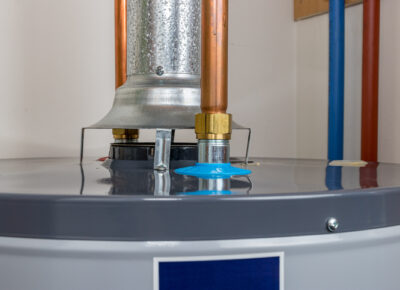Water heaters are responsible for 25% of the energy used by our homes, but hot water is something we often take for granted. Being able to take a shower and have a comfortable water temperature is something we have become used to as Americans – we rarely think about hot water until we don’t have it. Hot water is also helpful for cleaning purposes like a kitchen sink with dishwasher or a washing machine for cleaning clothes. There are so many reasons people use hot water on a daily basis, and water heaters are an essential appliance in people’s homes.
A water heater’s average life span is ten years. Water heater manufacturers usually recommend replacing water heaters after ten years to avoid a flood or be inconvenienced with a breakdown. Depending upon where the water heater is located, if it leaks, it could cause a great deal of damage. Often water heaters are located in the basement, but if it is an unfinished basement with a sump pump, not much damage would happen with a leak. People with their water heater located on a first floor or attic, however, may want to replace an aging water heater to avoid a flood.
There are many different fuels used in heating domestic water, and there are many ways water heaters heat water. Water heaters may use oil, natural gas, propane, electricity, refrigerant or solar. The two most common water heaters work on gas or electric.
Natural gas is typically most desirable while electric is also common, but depending upon the location of the property, some homes do not have access to natural gas. Every homeowner needs to decide what is available and most efficient. Certain water heaters work better for certain situations and buildings, so depending on what the need is, the correct water heater needs to be selected and installed properly.
People often ask us what type of water heater is best. There is not really any single water heater that is best for everyone. Just like a vehicle, there are many that are designed for different purposes. Water heaters are designed with different levels of performance in mind. Choosing a water heater for a stadium or an older couple is two completely different needs for hot water.
There are many designs of water heaters that heat water in different ways. Traditionally, the tank water heater has been most common. This would typically be a large steel tank, with a gas burner under it or electric coils inside of it to heat the water. Since its original creation, the tank water heater has evolved into a very efficient water heating appliance.
The tankless water heater has also become very popular. Just like any different type of water heater, this type of water heater has positives and negatives. One of the reasons people get a tankless water heater is endless hot water. This type of water heater heats water instantly as it passes through the heat exchanger. This way of heating water can continue on and on. People can use all of their appliances and never run out of hot water.
A tank water heater eventually runs out of hot water and needs time to recover. A tankless tank will provide endless hot water. A tankless water heater is the most efficient type of water heater because it only burns fuel while using hot water. If no one uses hot water, the water heater will not burn fuel. A tank water heater is always burning fuel to keep that full tank of water hot and ready.
As a result, a tankless water heater uses the least amount of gas, saving customers money, but along with the positives there are a few negatives. Tankless water heaters are costly to initially install. Most of the time there is a lot of pipework for a new installation. Although the initial cost is more than traditional tank water heater, the efficiency and gas savings typically make it worth it over time.
Tankless water heaters also require yearly maintenance. Unlike a tank water heater, if this maintenance is not done annually, the unit will have premature problems. Most companies charge $200-300 for maintenance.
Another negative aspect with a tankless water heater is repairs: it is a mechanical machine that eventually breaks down. Tankless water heaters are very high tech, which makes them difficult and often costly to work on, and also requires a typically long wait for parts.
With all the different options out there, choosing the correct water heater for the application is important. There is not one water heater that is the best for all options. Depending upon the demand for hot water in a building, there are several good options. Consulting with a professional is highly recommended for guidance on a new water heater installation.
Do You Need Service, Repair or Replacement On Your South Jersey Water Heaters?
Complete the form below to Contact Us!

